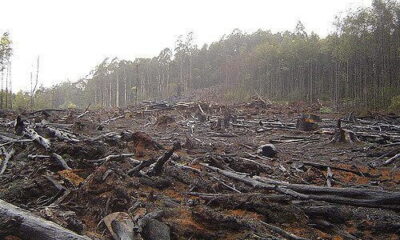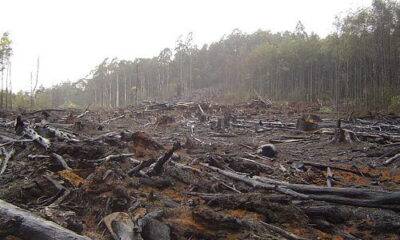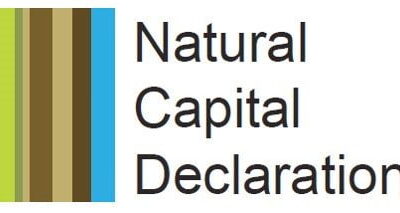

Economy
New Analysis and Ranking: c. $135 Billion Export Trade in Forest Risk Commodities Continues to Destroy Rainforests
The Global Canopy Programme’s ‘Forest 500’, the world’s first rainforest ratings agency that analyses the most influential companies, investors and governments in the race towards a deforestation-free global economy, today launched its annual results.
It revealed that while the corporate sector improved marginally overall, many laggards are yet to make public sustainability commitments. Commercial agriculture drives at least two thirds of tropical deforestation yet only 8% of all the 250 powerbroker companies assessed have zero or zero net commitments in place that apply across forest risk commodities (palm oil, soya, beef, leather, paper, and timber). The investment community has made even more limited progress, with the exception of BNP Paribas (France) who has become the first Forest 500 investor to make a commitment to zero net deforestation in their agricultural lendings.
The 2015 Forest 500, assessed and ranked 250 companies, with total annual revenues in excess of US $4.5 trillion; 150 investors and lenders; 50 countries and regions; and 50 other influential actors in this space. These 500 powerbrokers play a major role in supply chains for commodities fuelling deforestation, which accounts for 10% of global carbon emissions, a key contributor to climate change.
Andrew Mitchell, Founder and Executive Director of the Global Canopy Programme said, “GCP’s Forest 500 holds the most influential global players to account for their role in the deforestation economy. Together, these 500 powerbrokers control the complex supply chains of key ‘forest risk commodities’ that are found in over 50% of packaged products in supermarkets.
“Through these commodities, we are all part of a hidden deforestation economy – from our toothpaste, to our pensions. At this crucial time leading up to the international climate change negotiations, GCP is calling on these companies and investors to take the first critical step in addressing tropical deforestation by adopting, strengthening and implementing deforestation policies in their value chains.”
The 2015 Forest 500 found:
– Despite 2020 being a key deadline set by the New York Declaration on Forests, one year on since its publication, few powerbrokers have made new or strengthened procurement and production commitments.
– Whilst the corporate sector has improved marginally overall, many laggards are yet to make public sustainability commitments. Only 8% of all the 250 powerbroker companies now have zero or zero net commitments in place that apply across all forest risk commodities.
– The corporate leader board remains unchanged, with; Groupe Danone (France), Kao Corp. (Japan), Nestlé S.A. (Switzerland), Procter & Gamble (US), Reckitt Benckiser Group (UK), and Unilever (UK) the only companies to score 5 points.
– New York Declaration signatories lead the way towards achieving zero deforestation in agricultural supply chains scoring on average three times higher than non-signatories.
– The investment community has made even more limited progress with less than 1% of investors adopting zero or zero net commitments that apply to all of their investments or lendings in agricultural supply chains.
– BNP Paribas (France) has become the first Forest 500 investor to make a commitment to zero net deforestation in their agricultural lendings and joins HSBC (UK) in the top score band.
– Of the jurisdictions assessed, none has significantly strengthened their national or state-level deforestation policies to improve their Forest 500 score.
Séverin Fischer, BNP Paribas, Head of Environment and Extra Financial Accountability, said, ‘BNP Paribas has taken the strategic decision to make a zero net deforestation commitment that will be implemented by 2020. This applies to all our lendings in agricultural commodities as it makes both commercial and environmental sense, we are managing risk over the long term. The Forest 500 is an important benchmarking tool that helps us recognise risk in our portfolios and we are delighted that our leadership position has been recognised, we hope others will follow.’
Tom Bregman, Project Manager of the Forest 500 said, ‘The Forest 500 platform now includes significant enhancements which enable users to compare progress across sectors and target their engagement with powerbrokers to incentivise change. In the coming months, the Forest 500 is going to be working with others, together we hope to create a race to the top.’
2015 Forest 500 detailed findings:
Corporate Sector
Whilst there has been some improvement overall in the corporate sector, performance continues to be poor.
– Of the 31 companies that did not have any policy in year one, only four made a new public policy related to sustainable production/procurement of agricultural commodities this year. Furthermore, three companies dropped from one point to zero points due to a reduction in the amount of information that is publicly available (on their respective websites).
– Interestingly, North American headquartered companies make up 20% of the total membership of the Forest 500 and 33% of improvers are based here highlighting the progress that companies headquartered in North America are making.
– Driving behaviour change is central to the Forest 500 and so credit goes to the 31 companies who moved up by at least one point, with five (Astra Agro Lestari, Groupe Eram, Grupo Bimbo, Mewah International, and News Corp.) moving up by two points and also to McDonalds and Bunge for introducing zero net deforestation policies across all of their commodities this year.
– Members of the Consumer Goods Forum, on average, score twice as many points as non-members.
The investment community
Performance of the investment community was even worse than the corporate sector.
– Nearly a third of investors assessed had no policies in place relating to their investments and lendings.
– However, the number of investors scoring two points out of five has increased from 35 to 44, with reductions in those scoring zero or one points.
– 18 investors improved their score by one or more points with three improving by two points (ATP, Columbia Threadneedle Investments, and Ontario Teachers Pension Plan).
– Overall there was an increase in the number of investors making commodity-specific sourcing policies. Specifically, the number of investors making lending commitments in relation to soy and cattle companies, increased from eight to 11 and six to eight respectively.
Remaining powerbrokers
Of the remaining powerbrokers that make up the 500, little has changed. Incremental progress has been made across forest, trading and subnational jurisdictions, with no countries releasing more comprehensive national policies focused on tackling deforestation


 Environment12 months ago
Environment12 months agoAre Polymer Banknotes: an Eco-Friendly Trend or a Groundswell?

 Features11 months ago
Features11 months agoEco-Friendly Cryptocurrencies: Sustainable Investment Choices

 Features12 months ago
Features12 months agoEco-Friendly Crypto Traders Must Find the Right Exchange

 Energy11 months ago
Energy11 months agoThe Growing Role of Solar Panels in Ireland’s Energy Future






























